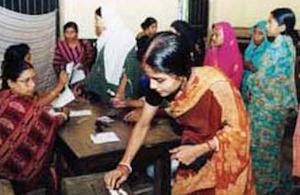DFID Research: informal local governance in rural South Asia
Finding ways to increase the accountability and effectiveness of public authority in the South.

Voting women. Picture: USAID Bangladesh
As part of the Research Programme ‘Development Research Centre for the Future State’, running from 2005 to 2010, a Central Research Department funded project was run to help policy makers and citizens find ways of increasing the accountability and effectiveness of public authority in South Asia.
Within this project, detailed, village level surveys in Karnataka in South India, and in Punjab province in Pakistan, were carried out that gave unique insights into how informal institutions mediate relations between villagers and formal (state) institutions, influencing the outcome of elections, the allocation of resources and the implementation of policy.
The 2 main partner institutions were the Lahore University of Management Sciences based in Lahore, Pakistan; and the Madras Institute of Development Studies (MIDS), based in Chennai, India.
This research highlighted, for local policymakers and international donors, the continuing importance of informal local governance institutions (ILGIs) in different parts of rural South Asia. It showed that ILGIs in South Asia are surprisingly persistent, diverse and influential. Their implications for development can be positive or negative, but either way, policymakers cannot afford to ignore them.
As a result of the findings, the Punjab Planning and Development Department has commissioned follow-on work with the specific objective of improving the targeting of development policies towards “backward” villages.
More information
Visit the website for the Centre for the Future State.